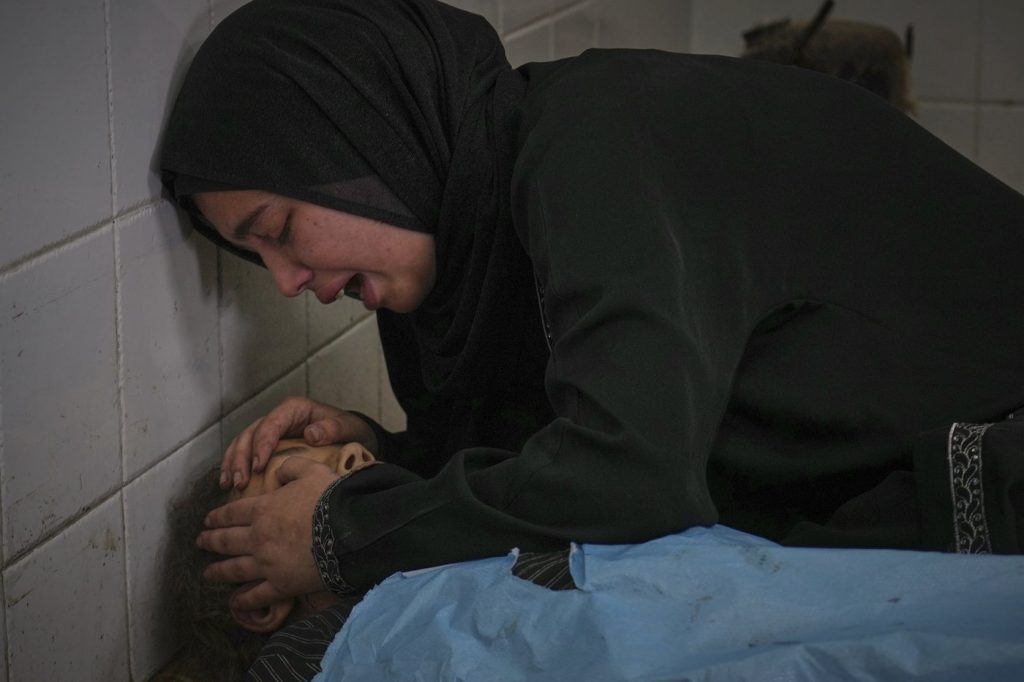DEIR AL-BALAH, Gaza Strip (AP) – European officials announced a new agreement with Israel to facilitate the delivery of essential food and fuel to Gaza, as confirmed by the European Union's foreign policy chief on Thursday. This development comes in the aftermath of an Israeli airstrike that claimed the lives of 15 individuals, including 10 children, who were waiting for aid outside a medical clinic.
The deaths of the children have incited outrage among humanitarian organizations, even as Israel permitted its first fuel delivery to Gaza in over four months—though, according to the United Nations, it only constituted less than a day's supply. Catherine Russell, UNICEF's chief, labeled the killings “unconscionable,” emphasizing that these victims were families desperately seeking nutritional support following prolonged hunger.
The Israeli military justified the airstrike by stating it was targeting a militant, while security footage showed a projectile exploding near the crowd gathered outside the clinic in central Gaza, leading to widespread casualties. Concurrently, Israeli Prime Minister Benjamin Netanyahu prepared for his departure from Washington after meetings with President Donald Trump, without reaching a consensus on a suggested temporary ceasefire.
The recently announced deal by European officials aims to enhance humanitarian aid access, potentially leading to more crossings being opened, an increase in aid vehicles entering Gaza, infrastructure repairs, and greater protection for aid workers. Kaja Kallas, the EU's chief diplomat, expressed hopes that Israel would adhere to the agreed measures. Aid organizations have reported significant challenges in delivering assistance due to ongoing Israeli military restrictions and violence in the region, even after a partial easing of the blockade in May.
The accord aims to restore aid corridors from Jordan and Egypt and reestablish community bakeries and kitchens throughout Gaza. Measures will reportedly be implemented to deter Hamas from diverting aid, as Israel has long accused the group of manipulating humanitarian resources for its military purposes. However, the U.N. maintains there is no substantial evidence supporting widespread diversion allegations.
Israeli Foreign Minister Gideon Saar acknowledged the arrangements at a conference in Vienna, indicating they followed discussions with the EU and would enhance humanitarian efforts through more trucks and alternate routes. However, details on whether the aid would be distributed via the U.N. system or another controversial U.S.-Israeli mechanism were not disclosed.
The U.N. reported that Israel had allowed a delivery of 75,000 liters of fuel into Gaza, marking the first such entry in 130 days. Yet, U.N. spokesman Stephane Dujarric cautioned that this amount was insufficient to meet even a single day's energy demands, warning that continued service shutdowns were imminent without further shipments.
In a separate escalation, Israeli airstrikes inflicted at least 36 Palestinian casualties overnight, according to local hospitals and aid workers. The Israeli military reported one soldier's death during these operations. Project Hope, the aid organization operating the targeted clinic, stated that the deceased were awaiting nutritional supplements. Dr. Mithqal Abutaha expressed that no child seeking food and medicine should be endangered by bombardment, highlighting the tragic loss of innocent lives.
At the Al-Aqsa Hospital, families mourned over the bodies of those lost in the strikes. Twelve children and women were part of the victims identified, with emotional pleas from bereaved relatives capturing the sorrow of the ongoing conflict. The Israeli military claimed their strike was aimed at a militant who had crossed into Israel during the ongoing conflict, and investigations are currently underway.
As Netanyahu prepares to depart Washington, he asserted that Israel is working toward a 60-day pause in hostilities and the release of half of the remaining hostages in Gaza, while signaling that negotiations for a sustainable end to the conflict would necessitate Hamas's disarmament. U.S. officials have indicated cautious optimism regarding the resumption of high-level negotiations mediated by Egypt and Qatar.
In parallel developments in the West Bank, violence continues to escalate, with clashes resulting in additional Israeli and Palestinian casualties. An Israeli soldier was killed while another encounter led to the death of a Palestinian man who reportedly attempted to stab a soldier. This cumulative violence has raised significant pressures on regional stability as the ongoing conflict continues to exact a heavy toll.












